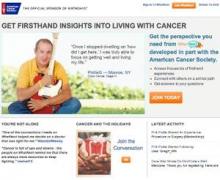When a cancer patient from Menomonie, Wis., reached out to the American Cancer Society’s WhatNext online network seeking treatment reassurance, a ready-made support group jumped into action.
"Anyone familiar with 5-FU [5-fluorouracil], cetuximab (Erbitux), or carboplatin? Has anyone ever worn a pump?" asked Packerbacker. "New nodule revealed metastatic cancer. ... I had cisplatin in the past and tolerated it with minor side effects. I’m still nervous, though. Wish me luck?"
An optimistic response came from a user in New Jersey: "I received 5-FU via a pump. ... Not fun, more of a pain in the butt. It turned out to not be a big deal at all," wrote IKickedIt.
"Good luck!" wrote FreeBird in Tampa, Fla. "Dad had carboplatin and Taxol [paclitaxel] for his previous lung cancer. He did really well with it!"
Patients and family members of patients described how to wear the pump, how to shower with the pump (by using plastic wrap and a shower head from a home improvement store), and how to disguise the pump (in a "cute backpack," suggested one user). Another user wrote, "Just kept the pump on my desk."
The new network boasts more than 10,000 registered users who pose questions and offer suggestions on topics both weighty and mundane.
"For those of you who had both options available, how did you decide between a lumpectomy and a mastectomy?" asked a mom from Cincinnati.
"Best advice for a caregiver who gets a bad cold?" queried Iibcarolek from California. "First of all, take care of yourself," advised Fizztig, who recommended frequent hand washing, using hand sanitizer, protecting sneezes, and getting enough rest.
By negotiating the well-organized website, users will find categories where they can share their experience and journey. Categories include "Oh, No," "Celebration," "Decision Point," and "Procedure or Surgery."
The website is organized by diagnosis. There is also a Pinboard where users can search, browse, or post inspirational photos and videos (similar to Pinterest).
One photo on the Pinboard is of a young girl wearing a scarf on her head with the following note from bcncnabb: "People stare. You all know this. You’ve all felt it in restaurants, at the grocery store, or any other place where people don’t get it. ... But wow, what people don’t notice is the fight, the spirit, and the grace that it takes to live with cancer."
Dr. Len Lichtenfeld, deputy chief medical officer of the American Cancer Society (ACS), endorsed the new online tool as an "exciting" use of technology to extend the reach of both the ACS and the oncology community. "We know that people who connect with each other in times like this feel more empowered, less anxious, and can approach this crucial time in their lives feeling supported," he noted.
The website’s exchange of practical tips reminded me of a caregiver’s lament about the difficulties of managing her husband’s percutaneous endoscopic gastrostomy (PEG) tube, which even the visiting in-home nurses didn’t really understand. In the exhausting days following his discharge after surgery for esophageal cancer, she taught herself how to triple flush the tube to prevent middle-of-the-night clogs.
Today, I would refer her to WhatNext, where I’m confident she would receive (and offer) pep talks and helpful advice.
In some cases, connections formed on WhatNext have led to offline friendships. The ACS highlighted a bond formed between MGM48 and MichaelV, both of whom have prostate cancer. "We compare notes and discuss life with cancer," said MGM48. "I’m happy to have a live sounding board sometimes.
"Let’s face it, no one outside really completely gets it," he said.
Dr. Freed is a clinical psychologist in Santa Barbara, Calif., and a medical journalist.


